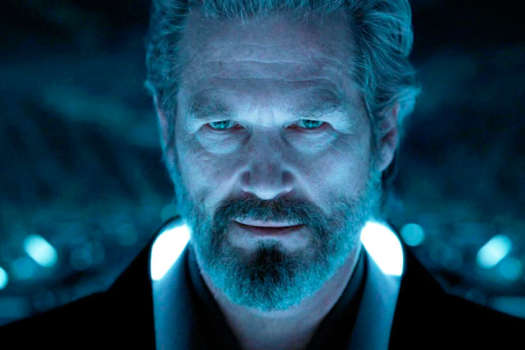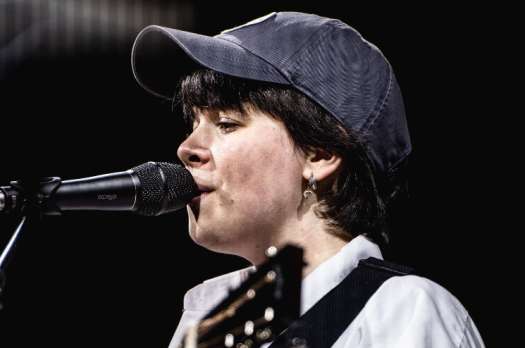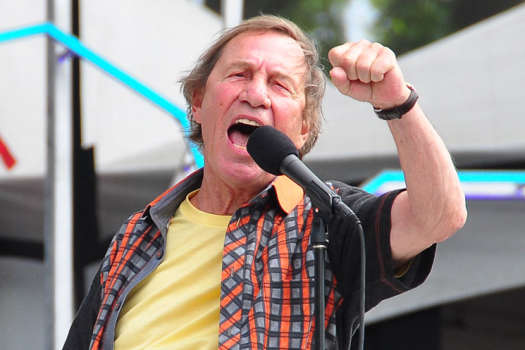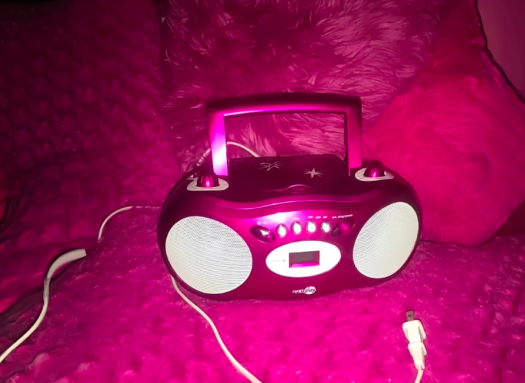The last decade and a half has seen women corner the market of danceable pop music, as most male solo artists are draped over their acoustic guitars weeping. Well, L.A.-based Aussie Sam Sparro has already made waves with his UK chart-reigning single "Black and Gold, a broodingly sublime slice of 80s rooted electro soul that signals a change is certainly coming. A benchmark for the current state of pop, Sparros self-titled debut is built of that songs slick production and jazzed energy, inserting nods to past heroes like Prince, George Michael and Cameo. Wisely investing in two of modern pops best producers, Paul Epworth (Bloc Party, Kate Nash) and Richard X (Annie, Rachel Stevens), Sparro laces his album with washes of late night glowing synths, funk-filled slap bass and fizzing beats. Besides "Black and Gold, the Basement Jaxx-lite grooves of "21st Century Life and the pulsating "Pocket show he wont end up in a bargain bin any time soon, but Sam does have a tendency to get stuck in homage mode, which tends to drag down the album on occasion. Nevertheless, this is certainly a confident and accomplished debut that motions to a bright future that could hopefully lead to us back to the cherished neon era of pop when artists like Sam Sparro ruled supreme.
One of the first things I noticed about you is that you have great taste in music, which isnt often the case with pop stars. How did you apply that to your music?
Thank you. I think I have always been on a quest to make music that lived up to those artists that I love listening to. For me, because I grew up singing in church, I really admire a lot of vocalists, but at the same time I also pay attention to the production. So I wanted to make an album that showcased both of those, and I started trying to fuse together sounds from 80s new wave and funk, post-punky disco stuff with a bit of 90s dance music but overall with a big soul voice over top of it. I just wanted to make an album that reflected a wide array of my tastes.
Most artists in your field usually just have the voice and rely on a producer to make the music, but thats not the case with you
Yeah, I originally had a four-track and began replicating things I liked at the time. I was listening to a lot of Bjorks Homogenic, and I had this recorder that Id program beats with and make some string sounds on the synthesiser. Thats really how I started to produce my music.
Is it important for you to be recognised more than just your voice?
I guess itd be nice for people to know that I do create the music and write the songs that Im performing. For me its just about, I know what I want to create in my head, and I have the skills and ability to do it. I just prefer doing everything myself and the process of being alone and creating something from scratch.
I read Chaka Khan was amazed that you were white when she heard you. Do you get that a lot?
Well, I was in Dublin and had an interview with this journalist who said she thought I was gonna be this big black man. In the previous sentence she said, "Your videos on TV all the time, you must be thrilled! I thought, well, youve obviously never seen the video. Some people expect me to be, well, someone said I sound like Cee-lo Green.
What did you want the album to sound like?
Because Id played a bunch of shows in L.A. before I started making the album and I much preferred playing tracks live that were much more danceable that people could sing along and dance to, because its just more fun being on stage in front of an audience that is entranced somehow. As far as a certain theme or mood, I definitely wanted there to be a lot of variety.
You chose to work with Paul Epworth and Richard X, two producers who seem like a perfect fit for the music. How did you decide on them?
Well, I just really got along with them. There were a few other producers that the A&R at the label was trying to set me up with to finish the last chunk of the record, and for me, really, they were just people I could work with. Im quite stubborn and a control freak, and I didnt want to give up or lose control of the creative responsibilities to somebody that I thought was a dick. So, I just really got on with them and I really like the music theyve done its quite versatile, but I think we a good point of view. Our references crossed over quite a lot. And they had good jokes too.
Your collaborator Jesse Rogg was also a producer. How did you decide which song would go to which producer?
I guess we just let them gravitate to what they thought theyd enjoy working on. We did produce a lot of the record ourselves, but there were a few tracks left that we needed some help with. A track like "Sally, which Id written five years ago, and there are 22 different versions of it, and Jesse and I just got to the point where we just wanted to finish it.
The male pop star seems like a thing of the 80s today. Why is that?
I think because mainstream music has been so hyper-masculinised by hip-hop culture in a lot of ways. In the 80s everyone was a bit campy, and nowadays in hipster culture, you cant tell whos gay and whos straight. But in mainstream American culture its still fairly misogynistic, a bit homophobic and very masculine. And I think danceable pop music is associated with being a bit girly.
Do you still think there is a stigma with gay artists in pop music?
I do, yeah, and I think in America, definitely.
Im sure being in place like Los Angeles though is a little different
Los Angeles has this massive hipster community, and theres lots of open-minded people, among the many ignorant ones as well. I think its easier in a place like L.A. or San Francisco, Miami, Chicago, New York. Like kids in the Midwest, they want to listen to T.I. and shit like that.
So, would you say the pop star lifestyle has lived up to your expectations yet?
[Laughs} Umm no! No, its definitely been different in a lot of ways than I expected. As a child when you fantasise about what you'd like your life to become theres a point where you arrive and nothing is ever difficult anymore. You think, "Once I achieve this Ill be living in Utopia. But its a complete façade. In some ways my life is better than it was, and in other ways its now more difficult than it was before. Its just a more amplified version of my life prior really; the pay-offs are extremely good: Ive met some incredible people, people I really admire, Ive travelled to some great places and Ive been able to perform my music in front of people that really love it. Thats been amazing. At the other end though, it can be quite exhausting work. Youre travelling a lot, so you dont sleep a lot, and theres promo and press
Yeah, sorry about that.
Well, its nice talking to someone whos actually interested in the music.
(Island)One of the first things I noticed about you is that you have great taste in music, which isnt often the case with pop stars. How did you apply that to your music?
Thank you. I think I have always been on a quest to make music that lived up to those artists that I love listening to. For me, because I grew up singing in church, I really admire a lot of vocalists, but at the same time I also pay attention to the production. So I wanted to make an album that showcased both of those, and I started trying to fuse together sounds from 80s new wave and funk, post-punky disco stuff with a bit of 90s dance music but overall with a big soul voice over top of it. I just wanted to make an album that reflected a wide array of my tastes.
Most artists in your field usually just have the voice and rely on a producer to make the music, but thats not the case with you
Yeah, I originally had a four-track and began replicating things I liked at the time. I was listening to a lot of Bjorks Homogenic, and I had this recorder that Id program beats with and make some string sounds on the synthesiser. Thats really how I started to produce my music.
Is it important for you to be recognised more than just your voice?
I guess itd be nice for people to know that I do create the music and write the songs that Im performing. For me its just about, I know what I want to create in my head, and I have the skills and ability to do it. I just prefer doing everything myself and the process of being alone and creating something from scratch.
I read Chaka Khan was amazed that you were white when she heard you. Do you get that a lot?
Well, I was in Dublin and had an interview with this journalist who said she thought I was gonna be this big black man. In the previous sentence she said, "Your videos on TV all the time, you must be thrilled! I thought, well, youve obviously never seen the video. Some people expect me to be, well, someone said I sound like Cee-lo Green.
What did you want the album to sound like?
Because Id played a bunch of shows in L.A. before I started making the album and I much preferred playing tracks live that were much more danceable that people could sing along and dance to, because its just more fun being on stage in front of an audience that is entranced somehow. As far as a certain theme or mood, I definitely wanted there to be a lot of variety.
You chose to work with Paul Epworth and Richard X, two producers who seem like a perfect fit for the music. How did you decide on them?
Well, I just really got along with them. There were a few other producers that the A&R at the label was trying to set me up with to finish the last chunk of the record, and for me, really, they were just people I could work with. Im quite stubborn and a control freak, and I didnt want to give up or lose control of the creative responsibilities to somebody that I thought was a dick. So, I just really got on with them and I really like the music theyve done its quite versatile, but I think we a good point of view. Our references crossed over quite a lot. And they had good jokes too.
Your collaborator Jesse Rogg was also a producer. How did you decide which song would go to which producer?
I guess we just let them gravitate to what they thought theyd enjoy working on. We did produce a lot of the record ourselves, but there were a few tracks left that we needed some help with. A track like "Sally, which Id written five years ago, and there are 22 different versions of it, and Jesse and I just got to the point where we just wanted to finish it.
The male pop star seems like a thing of the 80s today. Why is that?
I think because mainstream music has been so hyper-masculinised by hip-hop culture in a lot of ways. In the 80s everyone was a bit campy, and nowadays in hipster culture, you cant tell whos gay and whos straight. But in mainstream American culture its still fairly misogynistic, a bit homophobic and very masculine. And I think danceable pop music is associated with being a bit girly.
Do you still think there is a stigma with gay artists in pop music?
I do, yeah, and I think in America, definitely.
Im sure being in place like Los Angeles though is a little different
Los Angeles has this massive hipster community, and theres lots of open-minded people, among the many ignorant ones as well. I think its easier in a place like L.A. or San Francisco, Miami, Chicago, New York. Like kids in the Midwest, they want to listen to T.I. and shit like that.
So, would you say the pop star lifestyle has lived up to your expectations yet?
[Laughs} Umm no! No, its definitely been different in a lot of ways than I expected. As a child when you fantasise about what you'd like your life to become theres a point where you arrive and nothing is ever difficult anymore. You think, "Once I achieve this Ill be living in Utopia. But its a complete façade. In some ways my life is better than it was, and in other ways its now more difficult than it was before. Its just a more amplified version of my life prior really; the pay-offs are extremely good: Ive met some incredible people, people I really admire, Ive travelled to some great places and Ive been able to perform my music in front of people that really love it. Thats been amazing. At the other end though, it can be quite exhausting work. Youre travelling a lot, so you dont sleep a lot, and theres promo and press
Yeah, sorry about that.
Well, its nice talking to someone whos actually interested in the music.




